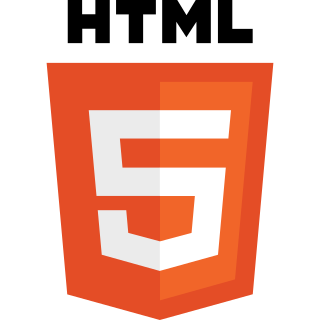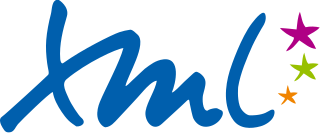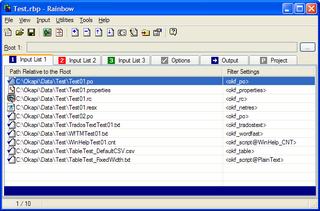Related Research Articles

HyperText Markup Language (HTML) is the standard markup language for documents designed to be displayed in a web browser. It defines the content and structure of web content. It is often assisted by technologies such as Cascading Style Sheets (CSS) and scripting languages such as JavaScript.

Extensible Markup Language (XML) is a markup language and file format for storing, transmitting, and reconstructing arbitrary data. It defines a set of rules for encoding documents in a format that is both human-readable and machine-readable. The World Wide Web Consortium's XML 1.0 Specification of 1998 and several other related specifications—all of them free open standards—define XML.
A translation memory (TM) is a database that stores "segments", which can be sentences, paragraphs or sentence-like units that have previously been translated, in order to aid human translators. The translation memory stores the source text and its corresponding translation in language pairs called “translation units”. Individual words are handled by terminology bases and are not within the domain of TM.
The Darwin Information Typing Architecture (DITA) specification defines a set of document types for authoring and organizing topic-oriented information, as well as a set of mechanisms for combining, extending, and constraining document types. It is an open standard that is defined and maintained by the OASIS DITA Technical Committee.

Learning Object Metadata is a data model, usually encoded in XML, used to describe a learning object and similar digital resources used to support learning. The purpose of learning object metadata is to support the reusability of learning objects, to aid discoverability, and to facilitate their interoperability, usually in the context of online learning management systems (LMS).

OmegaT is a computer-assisted translation tool written in the Java programming language. It is free software originally developed by Keith Godfrey in 2000, and is currently developed by a team led by Aaron Madlon-Kay.

The Okapi Framework is a cross-platform and open-source set of components and applications that offer extensive support for localizing and translating documentation and software.
Global information management Metrics eXchange or GMX is a collection of current and proposed standards, primarily targeted at the needs of the translation industry. They are concerned with measuring quantitatively aspects of a document, particularly those with relevance to the translation process and were being standardised by Localization Industry Standards Association as part of the Open Architecture for XML Authoring and Localization until the demise of LISA. The primary use cases are in quoting, estimating and billing translation work.
OAXAL: Open Architecture for XML Authoring and Localization is an Organization for the Advancement of Structured Information Standards (OASIS) standards-based initiative to encourage the development of an open Standards approach to XML Authoring and Localization. OAXAL is an official OASIS Reference Architecture Technical Committee.
XLIFF is an XML-based bitext format created to standardize the way localizable data are passed between and among tools during a localization process and a common format for CAT tool exchange. The XLIFF Technical Committee (TC) first convened at OASIS in December 2001, but the first fully ratified version of XLIFF appeared as XLIFF Version 1.2 in February 2008. Its current specification is v2.1 released on 2018-02-13, which is backwards compatible with v2.0 released on 2014-08-05.
Extensible HyperText Markup Language (XHTML) is part of the family of XML markup languages which mirrors or extends versions of the widely used HyperText Markup Language (HTML), the language in which Web pages are formulated.

EPUB is an e-book file format that uses the ".epub" file extension. The term is short for electronic publication and is sometimes stylized as ePub. EPUB is supported by many e-readers, and compatible software is available for most smartphones, tablets, and computers. EPUB is a technical standard published by the International Digital Publishing Forum (IDPF). It became an official standard of the IDPF in September 2007, superseding the older Open eBook (OEB) standard.
openTMS is an acronym for Open Source Translation Management System.
Segmentation Rules eXchange or SRX is an XML-based standard that was maintained by Localization Industry Standards Association, until it became insolvent in 2011, and then by the Globalization and Localization Association (GALA).
Localization Industry Standards Association or LISA was a Swiss-based trade body concerning the translation of computer software into multiple natural languages, which existed from 1990 to February 2011. It counted among its members most of the large information technology companies of the period, including Adobe, Cisco, Hewlett-Packard, IBM, McAfee, Nokia, Novell and Xerox.
Swordfish Translation Editor is a Computer-assisted translation software.
memoQ is a proprietary computer-assisted translation software suite which runs on Microsoft Windows operating systems. It is developed by the Hungarian software company memoQ Fordítástechnológiai Zrt., formerly Kilgray, a provider of translation management software established in 2004 and cited as one of the fastest-growing companies in the translation technology sector in 2012, and 2013. memoQ provides translation memory, terminology, machine translation integration and reference information management in desktop, client/server and web application environments.
TermBase eXchange (TBX) is an international standard for the representation of structured concept-oriented terminological data, copublished by ISO and the Localization Industry Standards Association (LISA). Originally released in 2002 by LISA's OSCAR special interest group, TBX was adopted by ISO TC 37 in 2008. In 2019 ISO 30042:2008 was withdrawn and revised by ISO 30042:2019. It is currently available as an ISO standard and as an open, industry standard, available at no charge.

Lingotek is a cloud-based translation services provider, offering translation management software and professional linguistic services for web content, software platforms, product documentation and electronic documents.
References
- ↑ "TMX Format Specifications Version 1.0". Open Standards for Container/Content Allowing Re-use (OSCAR). 25 November 1997. Retrieved 25 June 2014.
- 1 2 Savourel, Yves; Lommel, Arle (26 April 2005). "TMX 1.4b Specification". The Localisation Industry Standards Association (LISA). Archived from the original on 12 January 2013.
- 1 2 "LISA OSCAR Standards". Globalization and Localization Association (GALA). Retrieved 25 June 2014.
- ↑ "TMX: Translation Memory eXchange -TMX 2.0 released for public comment". LISA Standards Association. 28 March 2007. Archived from the original on 2007-10-26.
- ↑ "TMX 2.0 Specification - OSCAR Working Draft". LISA Standards Association. 28 March 2007. Archived from the original on 2007-10-11.